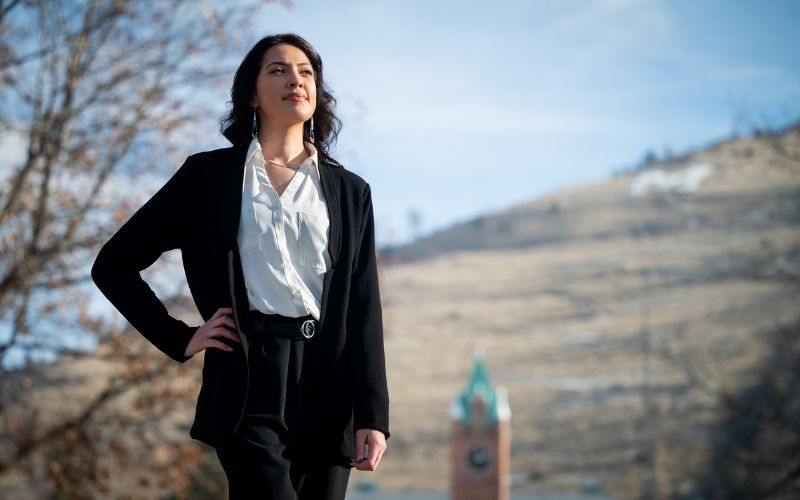
- Details
- By Elyse Wild
The MMIP crisis is prevalent across the country, with Indigenous peoples being murdered at a rate ten times the national average. Homicide is one of the leading causes of death for Native women. While the Bureau of Indian Affairs estimates there are 4,200 unsolved MMIP cases, the actual number is likely higher, Native advocates say. According to the Urban Indian Health Institute, Montana ranks among the top states for the highest number of MMIP cases per capita, with Native Americans making up 6.7% of the state’s population and 27% of its missing people.
In 2023, the Montana legislature passed a bill extending the task force for ten years and supporting the staffing of a full-time program coordinator. Before the bill, the task force was up for termination or renewal every two years. In April this year, the Montana Department of Justice hired former law enforcement officer and search and rescue coordinator Justin Kambic as the task force’s coordinator.
Among the new appointments to the task force is Haley Omeasoo, a citizen of the Hopi Tribe and a Blackfeet descendant and founder of Ohkomi Forensics, which provides forensic services to Indigenous families and communities affected by the crisis.
Omeassoo wrote in an email to Native News Online that she is grateful to have a seat at the table and hopes her expertise in forensics will help lower the number of unsolved MMIP cases throughout the state.
“A task as huge as the MMIP crisis, I truly believe, will take a team effort, so I am very excited to be serving alongside this incredible group of people who all show their passion for combating this issue,” Omeassoo wrote. “I want to personally thank our MMIP Task Force coordinator, Justin Kambic, for all the great work he has done thus far and for taking a chance on me and Ohkomi Forensics. We look forward to all that is to come from serving on this task force and appreciate everyone’s support during this time.”
The remaining appointments to the task force include:
- Alan Doane, representing the Montana Attorney General’s Office. Doane previously served as a state representative.
- Yolanda Fraser, representing the Northern Cheyenne Tribe. Fraser’s 18-year-old granddaughter, Kaysera Stops Pretty Places, was found dead in Hardin in 2019. Fraser founded Pretty Eaglewoman Resource Foundation to bring awareness to the crisis.
- Brian Frost, missing persons specialist for the Montana Department of Justice.
- Stacie FourStar, Chief Judge of the Fort Peck Tribal Court. In 2022, she won the Karla M. Gray Equal Justice Award for her advocacy.
- Crystal Hickman, representing the Montana Office of Public Instruction. Hickman is a citizen of the Crow Tribe and of Northern Cheyenne descent. She serves as the American Indian student achievement specialist within OPI.
- Cheryl Horn, representing Fort Belknap Indian Community. Horn’s niece Selena Not Afraid, 16, went missing and was found dead in Big Horn County in 2020.
- Iris Kill Eagle, councilwoman for the Little Shell Tribe of Chippewa Indians of Montana.
- Danielle Matt, representing the Confederated Salish & Kootenai Tribes. Matt’s niece Jermain Charlo, 23, went missing in 2018 and has not been found.
- Amanda Myers, representing the United States Attorney’s Office.
- Alan Ostby, representing the Indian Health Service. Ostby is a licensed clinical psychologist for the Yellowstone Counseling Center.
- Derek Werner of Poplar will represent the Montana Highway Patrol.
- Jonathan Windy Boy, representing the Chippewa Cree Tribe. Windy Boy has served in the state Legislature for more than 20 years.
- Sarah Wolftail, representing the Blackfeet Nation. Wolftail was among a group of 14 law enforcement professionals who were honored for investigating Stanley Patrick Weber, a former pediatrician who was convicted of sexually abusing boys in the 1990s on the Blackfeet Reservation.
More Stories Like This
Native News Weekly (August 25, 2024): D.C. BriefsNavajo Nation Mourns the Passing of Former Vice President Rex Lee Jim
Deb Haaland Earns Endorsement From Communications Workers of America Local 7076
University Soccer Standout Leads by Example
Two Native Americans Named to Democratic Congressional Campaign Committee's“Red to Blue” Program
Help us defend tribal sovereignty.
At Native News Online, our mission is rooted in telling the stories that strengthen sovereignty and uplift Indigenous voices — not just at year’s end, but every single day.
Because of your generosity last year, we were able to keep our reporters on the ground in tribal communities, at national gatherings and in the halls of Congress — covering the issues that matter most to Indian Country: sovereignty, culture, education, health and economic opportunity.
That support sustained us through a tough year in 2025. Now, as we look to the year ahead, we need your help right now to ensure warrior journalism remains strong — reporting that defends tribal sovereignty, amplifies Native truth, and holds power accountable.
 The stakes couldn't be higher. Your support keeps Native voices heard, Native stories told and Native sovereignty defended.
The stakes couldn't be higher. Your support keeps Native voices heard, Native stories told and Native sovereignty defended.
Stand with Warrior Journalism today.
Levi Rickert (Potawatomi), Editor & Publisher


